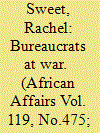| Srl | Item |
| 1 |
ID:
172579


|
|
|
|
|
| Summary/Abstract |
Rebels often portray themselves as state-like to legitimize their rule, yet little is known about their on-the-ground relations with the administrators of state power—official bureaucrats. Drawing on internal armed group records from the Democratic Republic of Congo, this article argues that rebels’ state-like image is more than a simple veneer: Bureaucrats actively sustain state institutions and recruit rebel support during war. It develops a theory of the sources of leverage that bureaucrats use to negotiate with rebels. These interactions entail dual struggles to sustain the structures and symbols of state power and to shape the distribution of control over these institutions during war. On first front, bureaucrats can use their official status to market the symbols of state legitimacy—official certificates, codes, and paperwork—to rebels. On a second, to recruit protection for administrative posts. Pre-existing routines of noncompliance, like parallel taxes and sabotaged information, can use bureaucratic discretion and opacity to limit rebels’ takeover of state structures. This view from the ground demonstrates the real-time continuity of bureaucratic practice through daily paperwork and exchange during war. It contributes to research on rebel governance by illustrating new competitions for wartime statehood and illustrates the empirical practices of states seen as ‘juridical’ or weak.
|
|
|
|
|
|
|
|
|
|
|
|
|
|
|
|
| 2 |
ID:
181671


|
|
|
|
|
| Summary/Abstract |
Although rebel groups are players on the international stage, little is known about their financial strategies at this scale. Existing research suggests that rebels succeed in cross-border trade by using informal networks that evade state authority. Yet rebels face a critical challenge: they operate in a normative environment that values state recognition and penalizes their illegitimate status. New evidence reveals that rebels can overcome this barrier and better connect to global economies not by evading the state but by infiltrating its institutions. Drawing on unprecedented data—the internal records of armed groups and their trading partners—I examine how rebels use state agencies in conflict zones to manufacture a legal cover for wartime trade. By using state agencies to provide false certification, rebels can place the stamp of state on their trade deals. This strategy of legal appropriation is a fundamentally different model of how conflict markets skirt sanctions and connect to global buyers. I develop a framework for how this strategy works that traces how international sovereignty norms and sanctions regimes create incentives for rebels, firms, and bureaucrats to coordinate around this legal veneer across the supply chain. The framework and evidence contribute theoretical and policy understandings for rebel governance, state building and fragmentation, and illicit global markets.
|
|
|
|
|
|
|
|
|
|
|
|
|
|
|
|